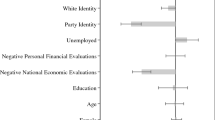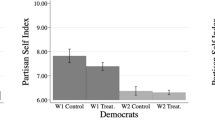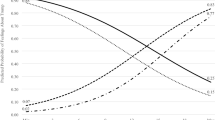Abstract
White Americans are more affectively polarized today than at any point since at least the 1870s—and the trend shows no sign of abating any time soon. Recent work using the Common In-group Identity Model (CIIM) suggests that appealing to a super-ordinate identity—in this case, American national identity—holds the potential of bridging the social distance between partisans (Levendusky, 2018). However, CIIM assumes that the normative content—i.e. the norms and stereotypes—that people associate with being an American are the same across subordinate groups. Using the 2016 and 2020 American National Election Studies cross-sectional surveys, as well as the 2016–2020 ANES panel survey, we demonstrate three key findings. First, White Democrats and White Republicans have systematically different ideas about what attributes are essential to being a member of the national community. Second, the association between partisanship and these competing conceptions of American identity among White Americans has gotten stronger during the Trump Era, largely because of Democrats adopting a more racially inclusive conception of American identity. Lastly, appeals to American identity only dampen out-partisan animosity when the demographic composition of the opposing party matches their racialized conception of American identity. When there is a mismatch between people’s racialized conception of American identity and the composition of the opposition party, American identity is associated with higher levels of partisan hostility.



Similar content being viewed by others
Data Availability
Replication data for this paper can be found at the Political Behavior dataverse: https://doi.org/10.7910/DVN/RO5BLP.
Change history
14 December 2022
The original article has been corrected to update abstract.
Notes
The standard measure of patriotism in the American National Election Study asks respondents, “how good/bad does R feel to see the American flag.” Conversely, the standard measure of nationalism asks respondents how much they agree with the following statement: “The world would be a better place if people from other countries were more like Americans.” Because these measures are meant to capture qualitatively different concepts, we avoid them in our analysis.
References
Achen, C. H., & Bartels, L. M. (2017). Democracy for realists. Princeton University Press.
Ahler, D. J., & Sood, G. (2018). The parties in our heads: Misperceptions about party composition and their consequences. The Journal of Politics, 80(3), 964–981.
Ashmore, R. D., Deaux, K., & McLaughlin-Volpe, T. (2004). An organizing framework for collective identity: Articulation and significance of multidimensionality. Psychological Bulletin, 130(1), 80–114.
Bartels, L. M. (2020). Ethnic antagonism erodes Republicans’ commitment to democracy. Proceedings of the National Academy of Sciences of USA, 117(37), 22752–22759.
Barwick, C., & Dawkins, R. (2020). Public perceptions of state court impartiality and court legitimacy in an era of partisan politics. State Politics and Policy Quarterly, 20(1), 54–80.
Bawn, K., Cohen, M., Karol, D., Masket, S., Noel, H., & Zaller, J. (2012). A theory of political parties: Groups, policy demands and nominations in American politics. Perspectives on Politics, 10(3), 571–597.
Berelson, B. R., Lazarsfeld, P. F., & McPhee, W. N. (1954). Voting: A study of opinion formation in a presidential campaign, Berelson, Lazarsfeld. University of Chicago Press.
Bishop, B. (2009). The big sort: Why the clustering of like-minded America is tearing us apart. Mariner Books.
Brewer, M. B. (1991). The social self: On being the same and different at the same time. Personality and Social Psychology Bulletin, 17(5), 475–482.
Brewer, M. B. (1996). When contact is not enough: Social identity and intergroup cooperation. Prejudice, Discrimination and Conflict, 20(3), 291–303.
Brown, A. (2020). Most Democrats who are looking for a relationship would not consider dating a Trump voter. Pew Research Center.
Carlin, R. E., & Love, G. J. (2018). Political competition, partisanship and interpersonal trust in electoral Democracies. British Journal of Political Science, 48(1), 115–139.
Carter, N. M., & Pérez, E. O. (2016). Race and nation: How racial hierarchy shapes national attachments. Political Psychology, 37(4), 497–513.
Citrin, J., Wong, C., & Duff, B. (2001). The meaning of American national identity: Patterns of ethnic conflict and consensus. In Social identity, intergroup conflict, and conflict reduction. Rutgers series on self and social identity (Vol. 3, pp. 71–100). Oxford University Press.
Dach-Gruschow, K., & Hong, Y. (2006). The racial divide in response to the aftermath of Katrina: A boundary condition for common ingroup identity model. Analyses of Social Issues and Public Policy, 6(1), 125–141.
Doherty, C., Kiley, J., & Asheer, N. (2020). In changing U.S. electorate, race and education remain stark dividing lines. Pew Research Center.
Doherty, C., Kiley, J., & Jameson, B. (2016). Partisanship and political animosity in 2016. Pew Research Center.
Doucerain, M. M., Amiot, C. E., Thomas, E. F., & Louis, W. R. (2018). What it means to be American: Identity inclusiveness/exclusiveness and support for policies about Muslims among U.S.-born Whites. Analyses of Social Issues and Public Policy, 18(1), 224–243.
Djupe, PA., Neiheisel, JR., & Sokhey, AE. (2018). Reconsidering the role of politics in leaving religion: The importance of affiliation. American Journal of Political Science, 62(1), 161–175. https://doi.org/10.1111/ajps.12308
Edelson, J., Alduncin, A., Krewson, C., Sieja, J. A., & Uscinski, J. E. (2017). The effect of conspiratorial thinking and motivated reasoning on belief in election fraud. Political Research Quarterly, 70(4), 933–946.
Egan, PJ. (2020). Identity as dependent variable: How Americans shift their identitis to align with their politics. American Journal of Political Science, 64(3), 699–716.
de Figueiredo, RJP., & Elkins, Z. (2003). Are patriots bigots? An inquiry into the vices of in-group pride. American Journal of Political Science, 47(1), 171–188 https://doi.org/10.1111/1540-5907.00012
Gaertner, S. L., Dovidio, J. F., Anastasio, P. A., Bachman, B. A., & Rust, M. C. (1993). The common ingroup identity model: Recategorization and the reduction of intergroup bias. European Review of Social Psychology, 4(1), 1–26.
Garrett, K. N., & Bankert, A. (2018). The moral roots of partisan division: How moral conviction heightens affective polarization. British Journal of Political Science, 50(2), 621–640.
Graham, M. H., & Svolik, M. W. (2020). Democracy in America? Partisanship, polarization, and the robustness of support for democracy in the United States. American Political Science Review, 114(2), 392–409.
Greene, S. (2004). Social identity theory and party identification. Social Science Quarterly, 85(1), 136–153.
Haidt, J., & Kesebir, S. (2010). Morality. In S. T. Fiske, D. T. Gilbert & G. Lindzey (Eds.), Handbook of social psychology (5th ed., Vol. 2, pp. 797–832). Wiley.
Huber, G. A., & Malhotra, N. (2017). Political homophily in social relationships: Evidence from online dating behavior. The Journal of Politics, 79(1), 269–283.
Huddy, L. (2001). From social to political identity: A critical examination of social identity theory. Political Psychology, 22(1), 127–156.
Huddy, L., & Khatib, N. (2007). American patriotism, national identity, and political involvement. American Journal of Political Science, 51(1), 63–77.
Iyengar, S., Lelkes, Y., Levendusky, M., Malhotra, N., & Westwood, S. J. (2019). The origins and consequences of affective polarization in the United States. Annual Review of Political Science, 22(1), 129–146.
Iyengar, S., Sood, G., & Lelkes, Y. (2012). Affect, not ideology: A social identity perspective on polarization. Public Opinion Quarterly, 76(3), 405–431.
Iyengar, S., & Westwood, S. J. (2015). Fear and loathing across party lines: New evidence on group polarization. American Journal of Political Science, 59(3), 690–707.
Jardina, A. (2019). White identity politics. Cambridge studies in public opinion and political psychology. Cambridge University Press.
Jacobs, CM., Theiss-Morse, E. (2013). Belonging In a “Christian Nation”: The Explicit and Implicit Associations between Religion and National Group Membership. Politics and Religion, 6(2), 373–401. https://doi.org/10.1017/S1755048312000697
Klar, S. (2018). When common identities decrease trust: An experimental study of partisan women. American Journal of Political Science, 62(3), 610–622.
Klar, S., Krupnikov, Y., Ryan JB. (2022). Who Are Leaners? How True Independents Differ from the Weakest Partisans and Why It Matters. The Forum, 20(1), 155–167.
Klofstad, C. A., McDermott, R., & Hatemi, P. K. (2013). The dating preferences of Liberals and Conservatives. Political Behavior, 35(3), 519–538.
Levendusky, M. (2009). The partisan sort: How Liberals became Democrats and Conservatives became Republicans. University of Chicago Press.
Levendusky, M. (2018). Americans, not partisans: Can priming American national identity reduce affective polarization? The Journal of Politics, 80(1), 59–70.
Levendusky, M., & Malhotra, N. (2016a). (Mis)perceptions of partisan polarization in the American public. Public Opinion Quarterly, 80(S1), 378–391.
Levendusky, M., & Malhotra, N. (2016b). Does media coverage of partisan polarization affect political attitudes? Political Communication, 33(2), 283–301.
Mason, L. (2015). ‘I Disrespectfully Agree’: The differential effects of partisan sorting on social and issue polarization. American Journal of Political Science, 59(1), 128–145.
Mason, L. (2018). Losing common ground: Social sorting and polarization. The Forum, 16(1), 47–66.
McConnell, C., Margalit, Y., Malhotra, N., & Levendusky, M. (2018). The economic consequences of partisanship in a polarized era. American Journal of Political Science, 62(1), 5–18.
Mettler, S., & Lieberman, R. (2020). Four threats: The recurring crises of American democracy. New York: St. Martin's Press.
Mummendey, A., Klink, A., & Brown, R. (2001). Nationalism and Patriotism: National Identification and out-group projection. British Journal of Social Psychology, 40, 159–172. https://doi.org/10.1348/014466601164740
Nicholson, S. P. (2012). Polarizing cues. American Journal of Political Science, 56(1), 52–66.
Olson, J. (2008). Whiteness and the polarization of American politics. Political Research Quarterly, 61(4), 704–718.
Pérez, E. O., Deichert, M., & Engelhardt, A. M. (2019). E Pluribus Unum? How ethnic and national identity motivate individual reactions to a political ideal. The Journal of Politics, 81(4), 1420–1433.
Rothschild, J. E., Howat, A. J., Shafranek, R. M., & Busby, E. C. (2019). Pigeonholing partisans: Stereotypes of party supporters and partisan polarization. Political Behavior, 41(2), 423–443.
Rutchick, A. M., & Eccleston, C. P. (2010). Ironic effects of invoking common ingroup identity. Basic and Applied Social Psychology, 32(2), 109–117.
Sidanius, J., & Kurzban, R. (2013). Toward an evolutionarily informed political psychology. In L. Huddy, D. O. Sears & J. S. Levy (Eds.), The Oxford handbook of political psychology (2nd ed., pp. 205–236). OUP.
Smith, R. M. (1993). Beyond Tocqueville, Myrdal, and Hartz: The multiple traditions in America. The American Political Science Review, 87(3), 549–566.
Smith, R. M., & King, D. (2021). White protectionism in America. Perspectives on Politics, 19(2), 460–478.
Steffens, M. C., Reese, G., Ehrke, F., & Jonas, K. J. (2017). When does activating diversity alleviate, when does it increase intergroup bias? An ingroup projection perspective. PLoS ONE, 12(6), e0178738.
Stoker, L., & Kent Jennings, M. (2008). Of time and the development of partisan polarization. American Journal of Political Science, 52(3), 619–635.
Tajfel, H. (1978). The achievement of inter-group differentiation. In H. Tajfel (Ed.), Differentiation between social groups: Studies in the social psychology of intergroup relations (pp. 77–100). Academic.
Tesler, M. (2012). The return of old-fashioned racism to White Americans’ partisan preferences in the early Obama era. The Journal of Politics, 75(1), 110–123.
Theiss-Morse, E. (2009). Who counts as an American? Chicago University Press.
Transue, J. E. (2007). Identity salience, identity acceptance, and racial policy attitudes: American national identity as a uniting force. American Journal of Political Science, 51(1), 78–91.
Westwood, SJ., & Peterson, E. (2022). The inseparability of race and partisanship in the United States. Political Behavior, 44(3), 1125–1147 https://doi.org/10.1007/s11109-020-09648-9
Wolak, J., & Dawkins, R. (2017). The roots of patriotism across political contexts. Political Psychology, 38(3), 391–408.
Zingher, JN. (2018). Polarization, demographic change, and white flight from the Democratic Party. The Journal of Politics, 80(3), 860–872.
Acknowledgements
We would like to thank Jennifer Wolak, Julie Wronski, Adam Cayton, Carey Stapleton, and Corey Barwick for offering thoughtful and constructive comments on earlier drafts of this paper. We would also like to thank the anonymous reviewers whose suggestions helped make this paper significantly stronger during the review process.
Author information
Authors and Affiliations
Corresponding author
Additional information
Publisher's Note
Springer Nature remains neutral with regard to jurisdictional claims in published maps and institutional affiliations.
Rights and permissions
Springer Nature or its licensor (e.g. a society or other partner) holds exclusive rights to this article under a publishing agreement with the author(s) or other rightsholder(s); author self-archiving of the accepted manuscript version of this article is solely governed by the terms of such publishing agreement and applicable law.
About this article
Cite this article
Dawkins, R., Hanson, A. ‘American’ is the Eye of the Beholder: American Identity, Racial Sorting, and Affective Polarization among White Americans. Polit Behav 46, 501–521 (2024). https://doi.org/10.1007/s11109-022-09834-x
Accepted:
Published:
Issue Date:
DOI: https://doi.org/10.1007/s11109-022-09834-x




